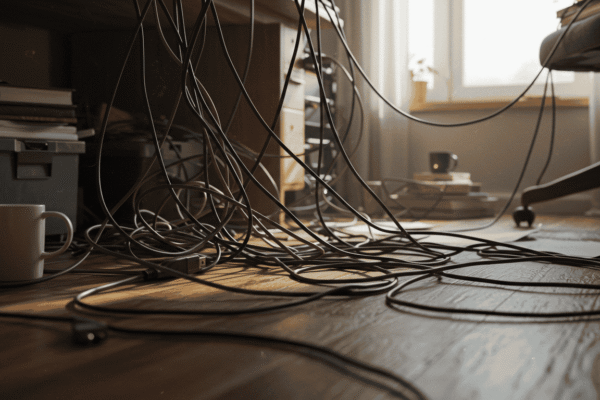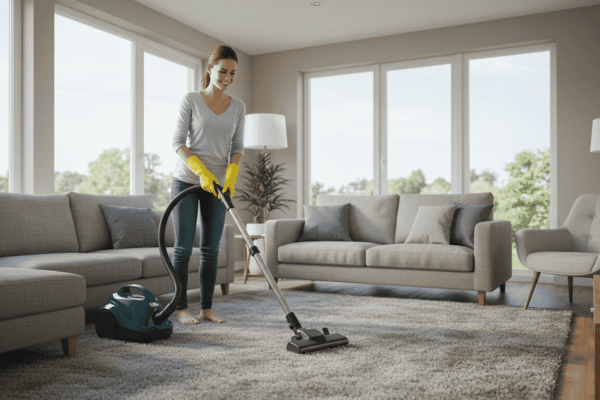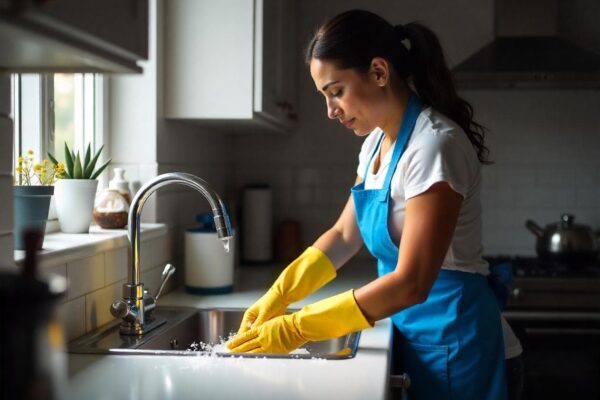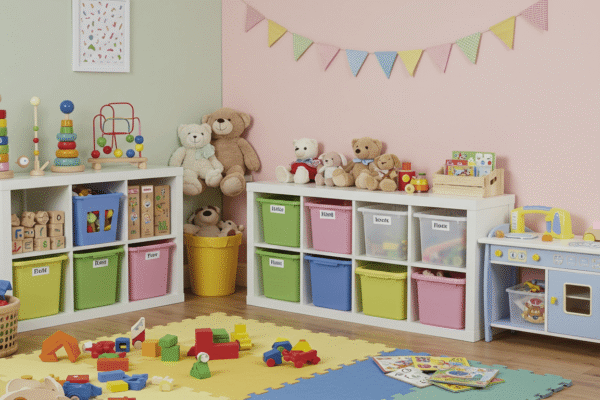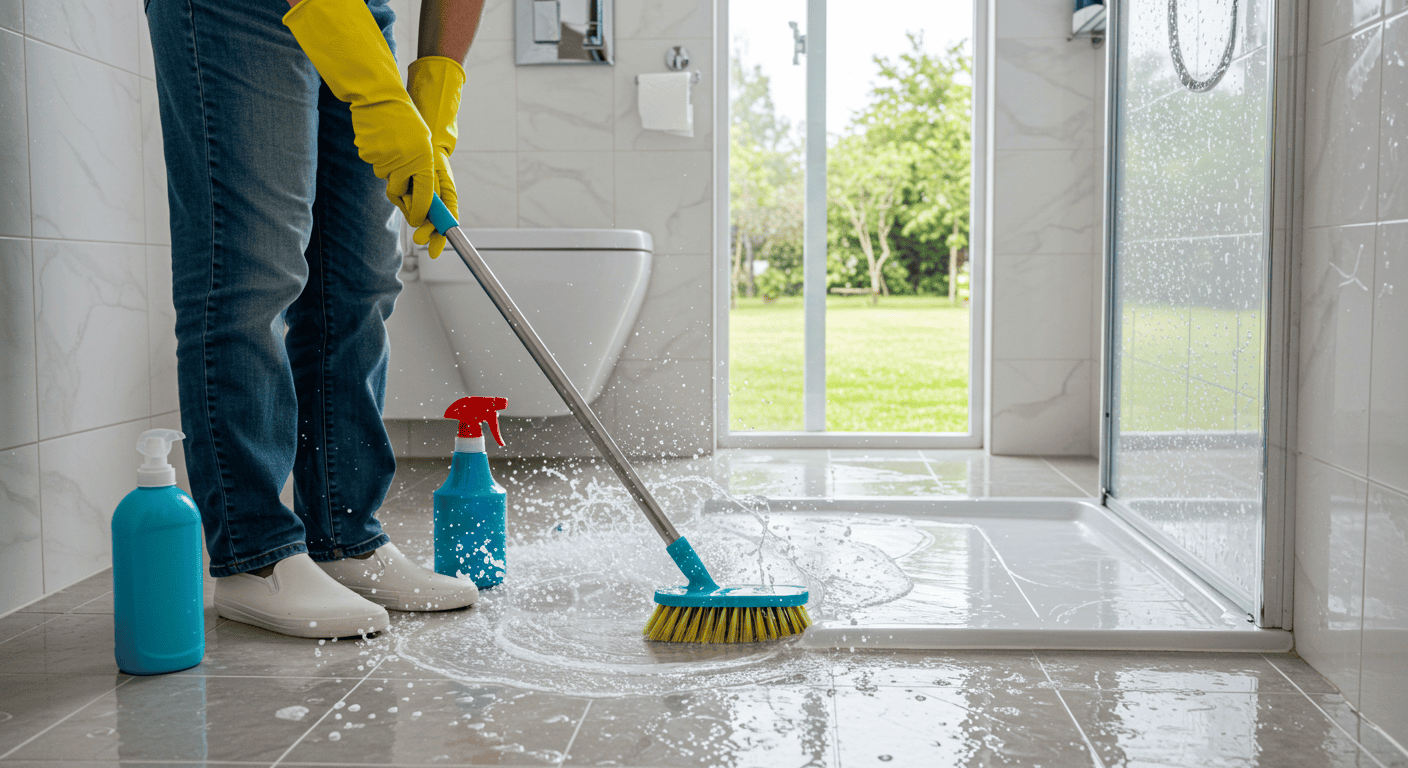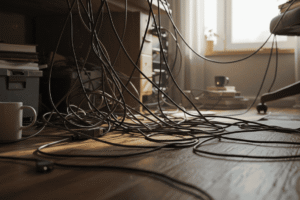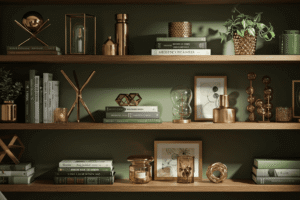Natural cleaning products for bathroom are no longer a niche trend—they’re a healthier, smarter way to keep your space spotless without exposing your family to harsh chemicals. Whether you’re dealing with stubborn grime, soap scum, or musty odors, eco-friendly and non-toxic bathroom cleaners offer effective solutions that are safe for both your home and the planet. In this guide, we’ll explore the most effective natural ingredients, easy DIY recipes, and smart tips to transform your bathroom into a fresh, sparkling space—without synthetic fumes or harmful residues.
Why Natural Cleaning Products Are Taking Over Bathrooms
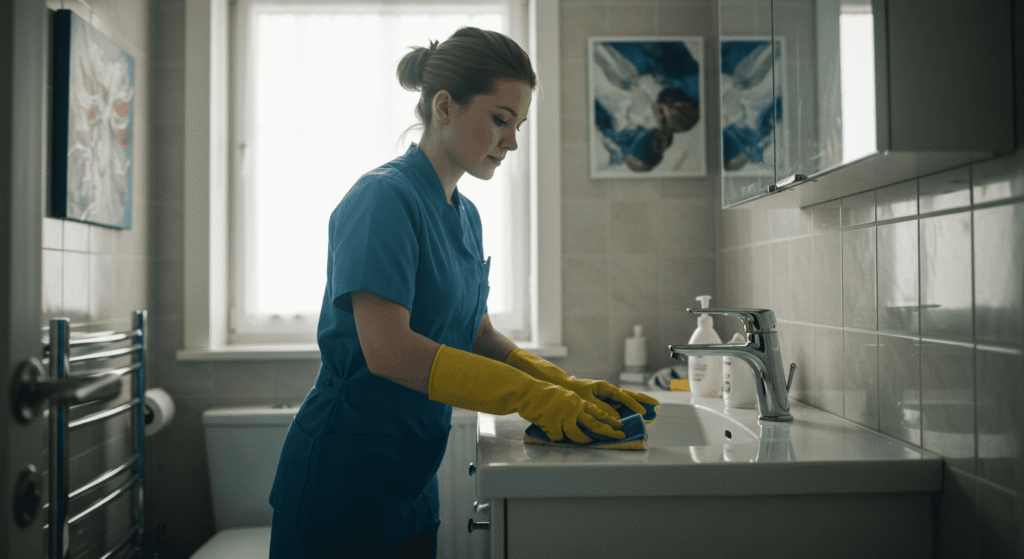
In recent years, natural cleaning products for bathroom use have skyrocketed in popularity—and for good reason. More and more people are looking for ways to maintain a clean, hygienic bathroom without relying on harsh chemicals that come with health risks and environmental consequences. These non-toxic bathroom cleaners offer powerful results while staying gentle on your home, your body, and the planet.
Health First – No More Harsh Fumes
One of the biggest reasons people are turning to chemical-free bathroom cleaners is for their health. Traditional bathroom products often contain ingredients like ammonia, chlorine, and synthetic fragrances—all of which can trigger headaches, allergies, skin irritation, and even long-term respiratory issues. Natural alternatives avoid these harsh substances and instead use ingredients like vinegar, baking soda, and essential oils, which clean just as effectively without releasing dangerous fumes into your home.
This makes a huge difference for households with children, pets, or anyone with asthma or sensitivities. You can clean your shower, sink, and toilet without worrying about inhaling toxins or wearing protective gloves every time.
Eco-Friendly and Planet-Safe
Beyond personal health, eco-friendly bathroom cleaning products are better for the environment. Chemical-based cleaners often get washed down the drain and end up in waterways, where they can harm aquatic life and disrupt ecosystems. Many of these chemicals are non-biodegradable, meaning they stick around for a long time, polluting both water and soil.
By switching to plant-based, biodegradable alternatives, you’re not just making a better choice for your bathroom—you’re contributing to a larger movement of sustainable, responsible living. Natural cleaners break down safely, reduce plastic waste when made at home, and leave behind no harmful residues.
Natural vs. Chemical Bathroom Cleaners
| Feature | Natural Cleaners | Chemical Cleaners |
|---|---|---|
| Safe for pets/kids | ✅ | ❌ |
| Harsh fumes | ❌ | ✅ |
| Biodegradable | ✅ | ❌ |
| Surface-safe | ✅ | ⚠️ |
As this comparison shows, natural cleaners aren’t just about going “green”—they’re about making practical, safe, and effective choices for your everyday life.
Core Ingredients That Power Natural Bathroom Cleaners
When it comes to natural cleaning products for bathroom, the most effective solutions often come from ingredients you probably already have in your kitchen or pantry. These simple, affordable substances can tackle everything from soap scum to stubborn stains — all without harsh chemicals.
The Big 5 Ingredients You Already Own
The foundation of many natural bathroom cleaners lies in five powerhouse ingredients: vinegar, baking soda, lemon juice, castile soap, and hydrogen peroxide. Each one offers unique cleaning benefits that make them indispensable for maintaining a fresh and spotless bathroom.
Vinegar is a natural acid that excels at breaking down grime, cutting through mineral deposits, and deodorizing surfaces. It’s especially effective on mirrors, glass, and toilets. Baking soda acts as a gentle abrasive, perfect for scrubbing sinks, tubs, and toilet bowls without scratching them. Lemon juice brings a fresh scent while cutting grease and stains, making it great for faucets and tiles. Castile soap is a plant-based surfactant that lifts dirt and grease from a variety of surfaces without leaving residues. Finally, hydrogen peroxide serves as a disinfectant and whitener, targeting mold, grout, and toilet seats effectively.
Why Essential Oils Are More Than Just Fragrance
Beyond the big five, essential oils play a vital role in enhancing natural bathroom cleaners. Oils such as tea tree, lavender, and eucalyptus aren’t just pleasant-smelling; they offer antibacterial and antifungal properties that help combat mold and mildew naturally. These oils also boost the cleaning power of your homemade products while leaving your bathroom smelling fresh and inviting without synthetic chemicals.
Here’s a quick reference to the natural benefits and best uses of these key ingredients:
| Ingredient | Natural Benefit | Best Used For |
|---|---|---|
| Vinegar | Breaks down grime, deodorizes | Mirrors, glass, toilets |
| Baking Soda | Gentle abrasive | Sinks, tubs, toilet bowls |
| Lemon Juice | Cuts grease, fresh scent | Faucets, tiles |
| Castile Soap | Natural surfactant | General surface cleaning |
| Hydrogen Peroxide | Disinfectant, whitens | Mold, grout, toilet seat |
This combination of ingredients forms the backbone of effective, safe, and eco-friendly bathroom cleaning products that you can trust and customize to suit your specific needs.
The Hidden Risks of Common Bathroom Cleaners
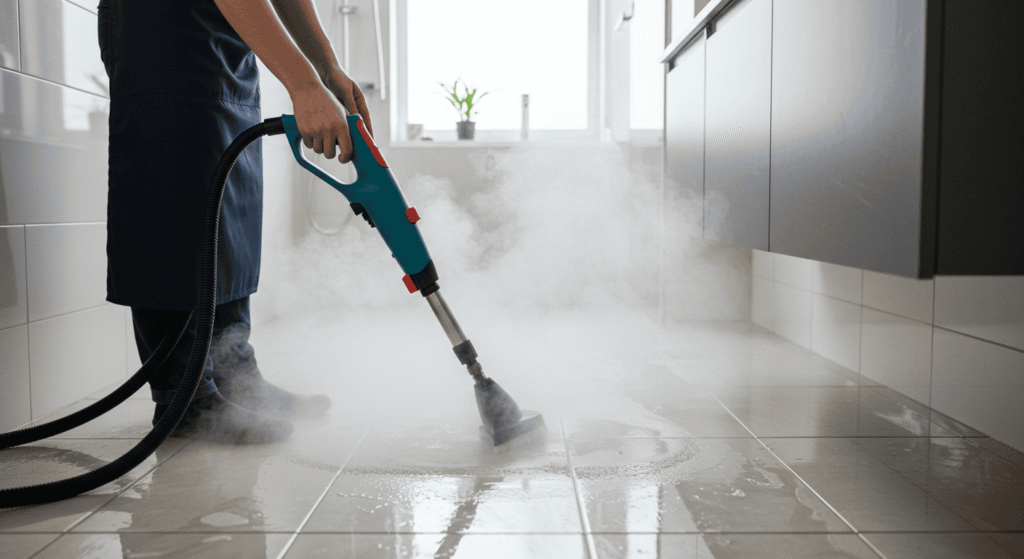
Many conventional bathroom cleaning products promise sparkling results, but few people stop to consider what’s actually inside those bottles. Understanding the hidden risks of these common cleaners can help you make safer choices for your home and health.
What’s Really in That Bottle?
Typical bathroom cleaners often contain harsh chemicals such as ammonia, chlorine, and synthetic fragrances. Ammonia is a strong irritant that can damage your eyes, skin, and respiratory system. Chlorine, commonly found in bleach-based cleaners, releases toxic fumes that can aggravate asthma and cause other breathing difficulties. Meanwhile, synthetic fragrances, while making products smell pleasant, are frequently made of volatile organic compounds (VOCs) linked to allergic reactions and long-term health risks.
These ingredients might provide quick cleaning results, but they come with hidden costs that many consumers are unaware of.
Long-Term Impact on You and the Environment
Regular exposure to these chemicals can lead to persistent skin irritation, respiratory problems, and even more serious health issues over time. For example, inhaling fumes during cleaning can worsen asthma or cause headaches and nausea. In addition to personal health risks, many chemical cleaners contribute to environmental pollution. When rinsed down drains, these substances enter waterways, harming aquatic ecosystems and contaminating drinking water sources.
Switching to natural cleaning products for bathroom means reducing your family’s exposure to harmful toxins while protecting the planet.
Toxic Ingredients to Avoid
| Ingredient | Why to Avoid |
|---|---|
| Ammonia | Irritates eyes, skin, lungs |
| Chlorine (Bleach) | Releases harmful fumes |
| Synthetic Fragrances | Can trigger allergies and asthma |
| Phthalates | Linked to hormonal disruptions |
| Formaldehyde Releasers | Known carcinogens |
Being informed about these hidden dangers empowers you to choose safer, healthier options that clean effectively without the risks.
DIY Natural Cleaning Recipes That Actually Work
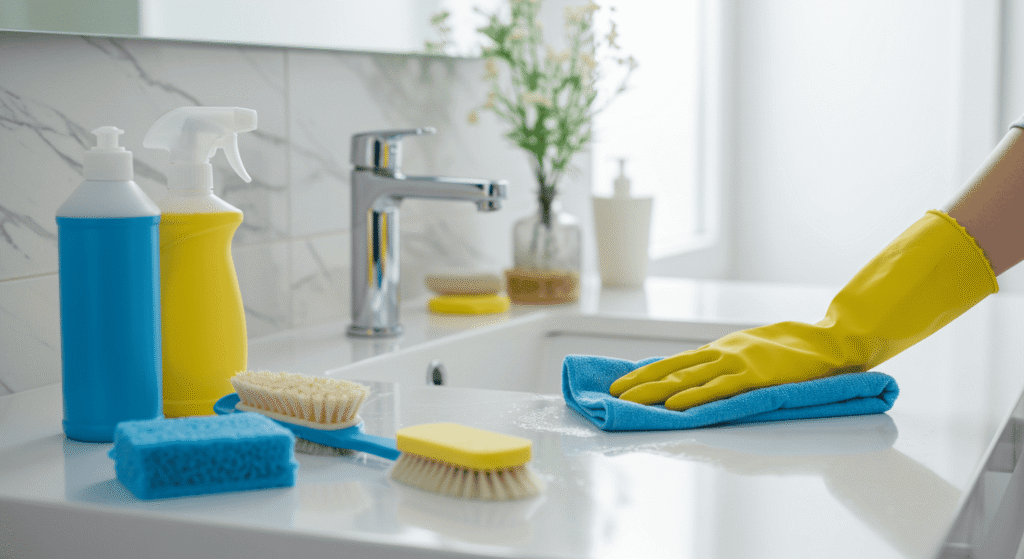
When you switch to natural cleaning products for bathroom, you don’t have to sacrifice effectiveness. In fact, some of the simplest homemade recipes can tackle dirt, grime, and germs just as well as commercial cleaners — without the toxic chemicals. Here are three easy, tried-and-true formulas you can make with everyday ingredients.
All-Purpose Bathroom Spray
This versatile spray is perfect for countertops, sinks, faucets, and even shower walls. It cuts through soap scum, removes mildew, and leaves your bathroom smelling fresh and clean.
Ingredients:
- 1 cup white vinegar
- 1 cup water
- 10 drops tea tree essential oil (antibacterial)
- 10 drops lavender essential oil (fresh scent)
Usage Tips:
Spray generously on surfaces and wipe clean with a microfiber cloth. Avoid using on natural stone like marble or granite due to vinegar’s acidity.
Grout Cleaner Paste
Tough grout stains and mildew don’t stand a chance against this natural paste. It gently lifts dirt without damaging grout lines.
Ingredients:
- ½ cup baking soda
- ¼ cup hydrogen peroxide
- 1 teaspoon castile soap
Usage Tips:
Apply the paste to grout lines and let sit for 10-15 minutes. Scrub with a small brush or old toothbrush, then rinse with warm water.
Toilet Bowl Fizz Bombs
These fizzing tablets make toilet cleaning easy and fun. They deodorize, break down stains, and disinfect naturally.
Ingredients:
- 1 cup baking soda
- ¼ cup citric acid
- 15 drops eucalyptus essential oil (antimicrobial)
- Water (just enough to bind)
Usage Tips:
Mix ingredients, spray lightly with water to form clumps, then press into molds and let dry overnight. Drop one fizz bomb into the toilet bowl, let fizz for 10 minutes, then scrub and flush.
Room-by-Room Breakdown: What to Use Where
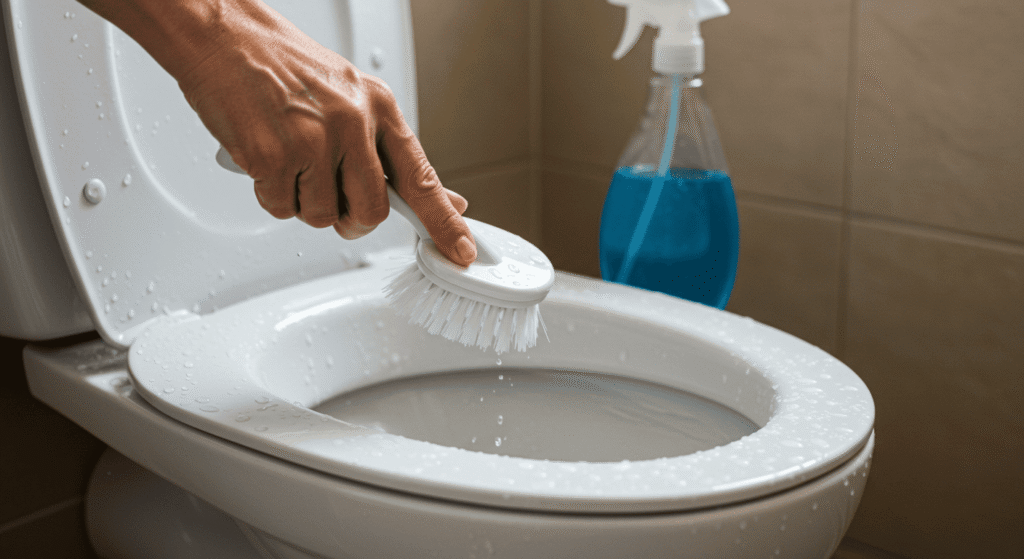
Understanding which natural cleaning products for bathroom work best on different surfaces helps you clean smarter, not harder. Each area in your bathroom faces unique challenges—so tailoring your approach ensures optimal results without damage.
Sink & Countertops
The sink and countertops are hotspots for soap residue, toothpaste stains, and water spots. Use gentle but effective ingredients to keep them sparkling.
Shower & Bathtub
Soap scum, hard water stains, and mildew are common here. Ingredients that cut grease and fight mold work best in these damp, high-traffic areas.
Toilet & Floor
The toilet requires disinfecting power to eliminate germs, while bathroom floors often accumulate dust, hair, and grime that need regular cleaning.
Recommended Cleaning Routine & Ingredients
| Area | Recommended Ingredients | How Often to Clean | Extra Tips |
|---|---|---|---|
| Sink & Countertops | Vinegar, baking soda, castile soap | Daily or every other day | Wipe dry to prevent water spots |
| Shower & Bathtub | Lemon juice, vinegar, baking soda | Weekly | Use a squeegee after showers to reduce buildup |
| Toilet | Baking soda, hydrogen peroxide | Twice weekly | Use fizz bombs or paste for deep cleaning |
| Floor | Castile soap diluted in water | Weekly | Mop with warm water and dry thoroughly |
Natural Mold, Mildew, and Odor Control Solutions
Bathrooms are prime spots for mold, mildew, and unpleasant odors, especially in humid environments. Fortunately, natural cleaning products for bathroom can effectively tackle these issues while keeping your space fresh and healthy—without toxic chemicals.
The Best Natural Antifungal Agents
Several natural ingredients are known for their powerful antifungal properties. Tea tree oil, hydrogen peroxide, and vinegar are among the top choices to combat mold and mildew. These agents not only inhibit fungal growth but also help prevent its return when used regularly. For stubborn mold patches, applying a mixture of hydrogen peroxide and tea tree oil directly can work wonders without damaging surfaces.
Dealing with Persistent Bathroom Smells Naturally
Persistent bathroom odors often come from bacteria buildup and trapped moisture. Instead of masking smells with synthetic fragrances, using natural deodorizing agents like baking soda, lemon juice, and essential oils keeps the air fresh while neutralizing odors at their source.
Essential Oil Blends That Refresh the Air
Essential oils can transform your bathroom into a naturally scented sanctuary. Combining oils enhances both their scent and antibacterial effects. For example:
- Lemon + eucalyptus: Bright, fresh, and uplifting
- Tea tree + lavender: Antimicrobial and soothing, great for mildew-prone areas
- Peppermint + rosemary: Invigorating and cleansing
Cleaning with Kids and Pets in Mind
When choosing natural cleaning products for bathroom, safety should be a top priority—especially in homes with curious kids and playful pets. Creating cleaning routines that protect your loved ones while keeping bathrooms spotless is easier than you think.
Child-Safe and Pet-Friendly Cleaning Routines
Natural ingredients like vinegar and baking soda are generally safe and effective for everyday cleaning. You can even turn cleaning into a fun family activity! For example, involve your kids by letting them mix up simple DIY sprays with water and a few drops of safe essential oils like lavender (used sparingly). This not only teaches them about safe cleaning but also makes them feel part of the process.
What to Avoid When Cleaning Shared Spaces
While many natural ingredients are safe, some essential oils can be harmful—especially to pets. Oils like tea tree, eucalyptus, and citrus varieties may cause irritation or worse in animals if ingested or heavily inhaled. Always store cleaning products out of reach and use pet-safe options in common areas. Also, avoid harsh chemical cleaners that pose risks to sensitive little noses and paws.
| Product/Ingredient | Safe for Kids | Safe for Pets |
|---|---|---|
| Vinegar | ✅ | ✅ |
| Essential Oils | ⚠️ (some) | ❌ (many toxic) |
| Baking Soda | ✅ | ✅ |
This simple guide helps families confidently choose natural cleaning solutions that keep everyone healthy and happy.
Sustainable Cleaning Habits Beyond Products
Choosing natural cleaning products for bathroom is just one step toward a healthier home and planet. Developing sustainable cleaning habits means rethinking the tools you use and how you organize your cleaning routine for minimal waste and maximum impact.
Tools That Matter – Think Bamboo Brushes & Reusable Cloths
Eco-friendly cleaning isn’t only about what’s in your bottle. Switching to bamboo brushes, reusable microfiber cloths, and washable sponges drastically reduces single-use plastic waste. Bamboo is biodegradable and naturally antimicrobial, making it a perfect choice for scrubbing bathroom surfaces without harming the environment.
How to Build a Minimalist Cleaning Kit
A clutter-free cleaning kit saves time, space, and money. Focus on versatile, multi-use tools and products. A well-curated kit might include a few glass spray bottles filled with DIY cleaners, a bamboo scrub brush, reusable cloths, and natural sponges. This minimalist approach encourages regular upkeep rather than last-minute deep cleans, creating a smoother, more sustainable routine.
Storing Your DIY Products the Right Way
Proper storage preserves the effectiveness of your homemade cleaners and keeps your bathroom organized. Use amber glass jars or bottles to protect essential oils from light, label everything clearly, and store sprays out of direct sunlight. Keeping your kit tidy also makes it easier to maintain your natural cleaning habits over time.
Embrace Natural Cleaning Products for Bathroom for a Healthier Home
Switching to natural cleaning products for bathroom isn’t just a trend—it’s a smart, sustainable choice that benefits your health, your family, and the environment. By using simple, effective ingredients and adopting eco-friendly habits, you can keep your bathroom spotless without harsh chemicals or harmful fumes. Embrace these natural solutions and enjoy a cleaner, safer, and fresher bathroom every day.

